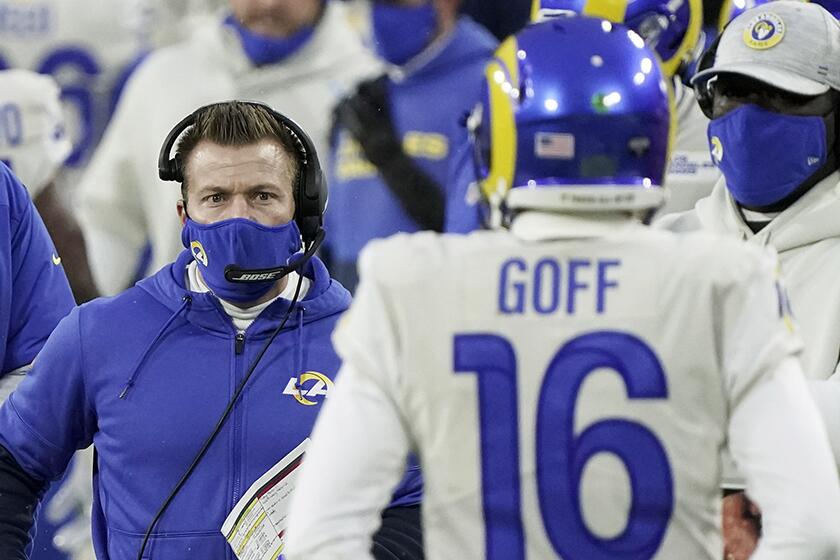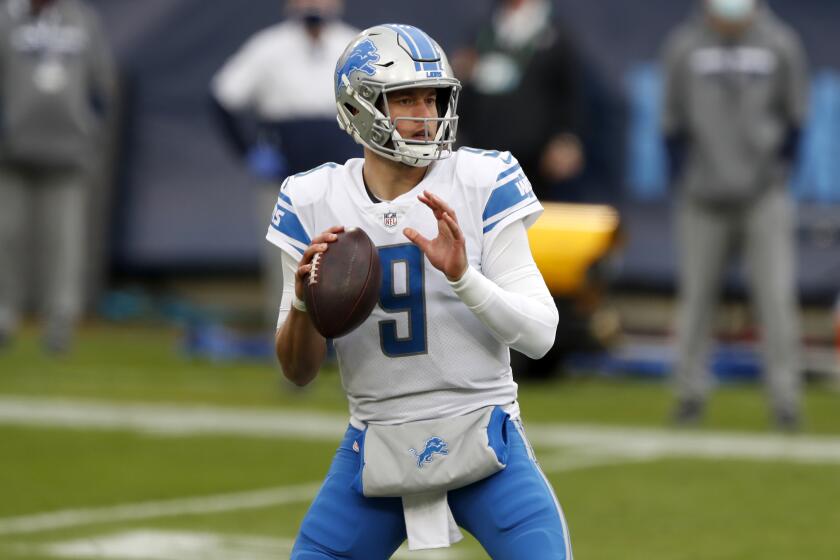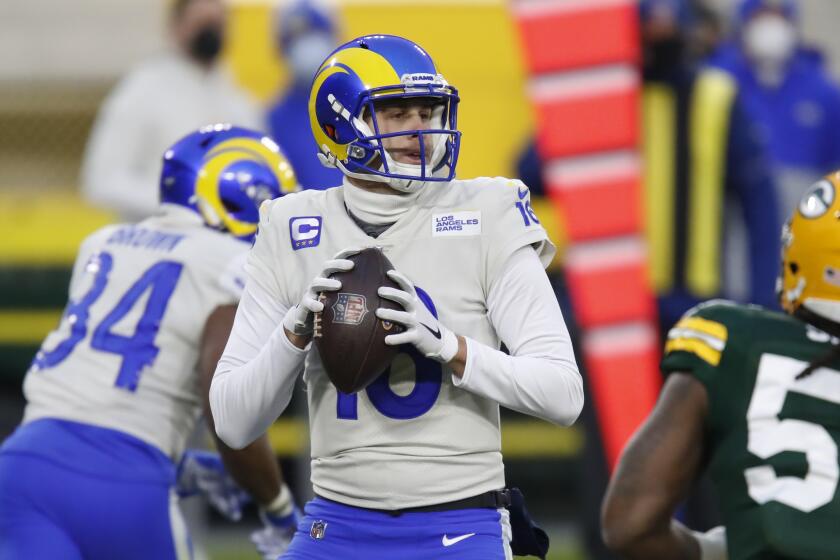Rams’ offense needs more than Matthew Stafford to win a Super Bowl
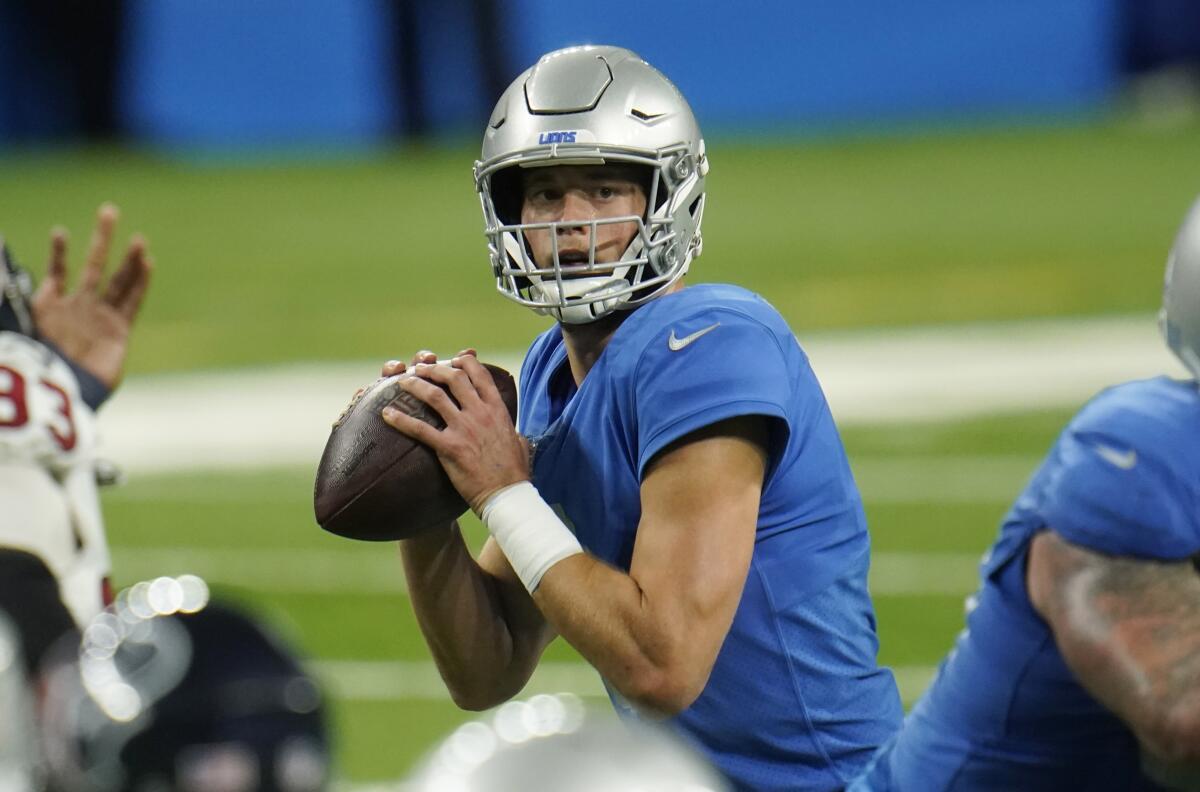
- Share via
A year from next Sunday, on Feb. 6, 2022, SoFi Stadium is scheduled to host Super Bowl LVI.
Since NFL and Rams officials broke dirt with ceremonial shovels in 2016, the Rams have dreamed of winning the sport’s biggest game in their $5-billion stadium.
That dream was born with quarterback Jared Goff in a starring role — the No. 1 pick in the 2016 draft tossed passes to stadium construction workers in 2018 — but Goff has been supplanted by Matthew Stafford, acquired Saturday in a trade with the Detroit Lions for Goff, a third-round pick in this year’s draft and No. 1 picks in 2022 and 2023.
The deal will not become official until March 17, when the new league year begins, and the Rams are banking on the 12-year veteran Stafford doing what Goff did not: winning a Super Bowl.
Goff helped the Rams and coach Sean McVay reach Super Bowl LIII in 2018. So Stafford’s mission, and perhaps the measure of the trade’s success, is nothing short of the Rams winning a championship.
Dylan Hernández weighs in on the Matthew Stafford-Jared Goff trade between the Rams and Detroit Lions on Saturday night.
To do that, McVay and the Rams must continue to retool an offense that has not been the same since former running back Todd Gurley’s left knee issue surfaced in the latter part of the 2018 season.
Stafford cannot be the only new piece if the Rams aim to advance past the NFC divisional round, where they lost to the Green Bay Packers.
“Offense is gonna be something that we’ll discuss many times,” general manger Les Snead said five days before he traded for Stafford. “I know Sean and I already have, on how do we get back to giving us that kind of edge that we want.”
The Rams’ offseason shopping list might include a receiver who provides a legitimate deep threat. With Sammy Watkins and then Brandin Cooks filling that role — and Gurley forcing defensive coordinators to commit to stopping the run — the offense flourished in 2017 and 2018. But last March, the Rams cut Gurley and traded Cooks to clear salary-cap space, leaving Goff without two of the weapons that helped him become a two-time Pro Bowl selection.
Before this season, McVay opined that Josh Reynolds could replace Cooks. But the Rams’ lone deep pass of note was a 56-yard strike to Robert Woods in a victory over Washington. Unlike other play-callers that seemingly sent receivers deep in search of a reception or pass-interference penalty, McVay did not.
“The long explosives and some of the shots down the field wasn’t as prevalent as years past,” McVay acknowledged the day after the loss to the Packers. “I think it made it a lot more difficult, and your margin for error is much slimmer as an offense when you feel like you’ve got to go 10 and 13 plays to score touchdowns.”
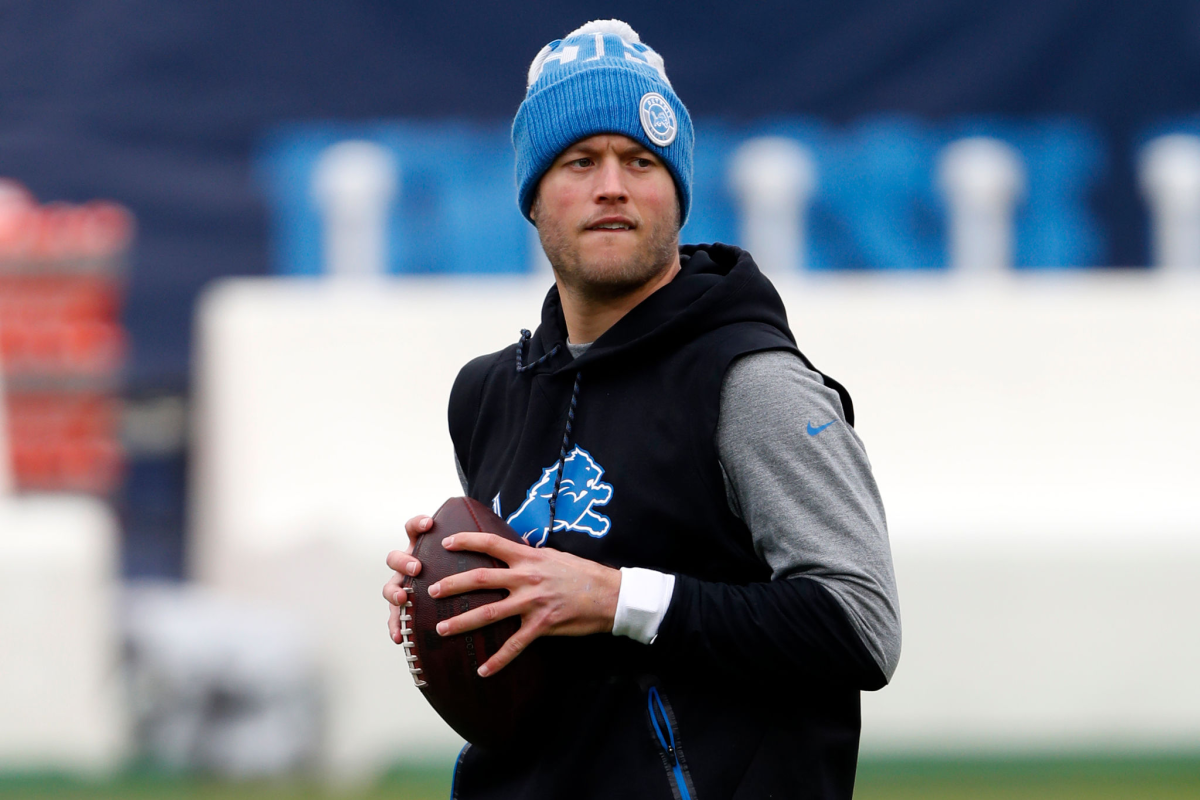
Goff said before this season that his goal was to have three 1,000-yard receivers. The Rams finished with none.
Woods caught 90 passes for 936 yards. Cooper Kupp, who had season-ending knee surgery in 2018, had 92 receptions for 974 yards, and sat out the loss to the Packers because of knee bursitis.
Reynolds is an unrestricted free agent, and Van Jefferson showed during his rookie season that he is ready to step in.
In 2019, Tyler Higbee showed signs of elevating into one of the NFL’s elite tight ends when he produced four 100-yard performances in a row. This season his season high was 67 yards and his receptions declined from 69 to 44.
Tight Gerald Everett is an unrestricted agent. Brycen Hopkins, a fourth-round pick last year, played only a few snaps in one game.
The Rams’ running game will be built around Cam Akers, who showed flashes of excitement as a rookie but also was sidelined twice because of injuries.
ESPN’s Dan Orlovsky says the Rams trading Goff for Stafford is a wise move. Quarterback Drew Stanton says Stafford processes so quickly, the game unfolds in slow motion for him.
Akers rushed for 625 yards and two touchdowns and made several plays as a receiver. In the loss to the Packers, McVay deployed Akers several times from the wildcat formation, perhaps a preview of a wrinkle that might be added next season.
But beyond Akers, the rushing attack is unsettled. Darrell Henderson has not proven durable, ending each of his first two seasons with injuries that required surgeries. Veteran Malcolm Brown is an unrestricted free agent.
The offensive line also could be in flux. Center Austin Blythe is an unrestricted free agent. Veteran left tackle Andrew Whitworth has indicated he might return for a 16th season but has not announced it.
“He’s mentioned to me that he plans to be back,” Snead said, “but I know that is something he wants to think about.”
The offense might not be the only major area of the concern. The defense ranked among the NFL’s best this season, but there is no guarantee it will be nearly as dominant next season.
Brandon Staley, who coordinated the Vic Fangio-inspired hybrid 3-4 scheme that utilizes multiple defensive backs, is now the Chargers’ coach. Inside linebackers coach Joe Barry has joined him, and cornerbacks coach Aubrey Pleasant left for more responsibility with the Lions staff.
Snead has said that McVay “has a vision to keep the DNA of the scheme that Brandon implemented,” and wants new coordinator Raheem Morris to continue it with his own spin. But Morris has never coached that scheme.
The Rams traded Jared Goff to the Detroit Lions as part of a deal for Matthew Stafford in a swap of quarterbacks who were No. 1 overall picks.
Star lineman Aaron Donald and star cornerback Jalen Ramsey are cornerstones for a unit that could lose several key players.
Edge rusher Leonard Floyd, safety John Johnson and cornerback Troy Hill are unrestricted free agents, as is rotational defensive lineman Morgan Fox. As the salary cap shrinks from $198 million to a projected $176 million, according to overthecap.com, and the Rams add Stafford’s $20-million cap hit to Goff’s $22-million dead-money cap hit, other veterans could feel the squeeze.
“It’s going to be an interesting offseason that will take maneuvering, adjustments, however that goes,” Snead said, speaking generally about the cap situation across the league before the trade. “Some veterans with higher salaries, will there be more veterans that want to continue with some semblance of stability and welcome salary reductions?
“Will those veterans and teams agree to part ways and test the waters and market and figure out what it really is and maybe re-sign back?”
In a move to further bolster his staff, McVay hired Joe DeCamillis to replace John Bonamego as special teams coordinator.
Kicker Matt Gay proved a reliable remedy after the Rams’ early season woes, and punter Johnny Hekker is among the best in the NFL. Long-snapper Jake McQuaide, the longest-tenured Ram, is an unrestricted free agent.
More to Read
Go beyond the scoreboard
Get the latest on L.A.'s teams in the daily Sports Report newsletter.
You may occasionally receive promotional content from the Los Angeles Times.

